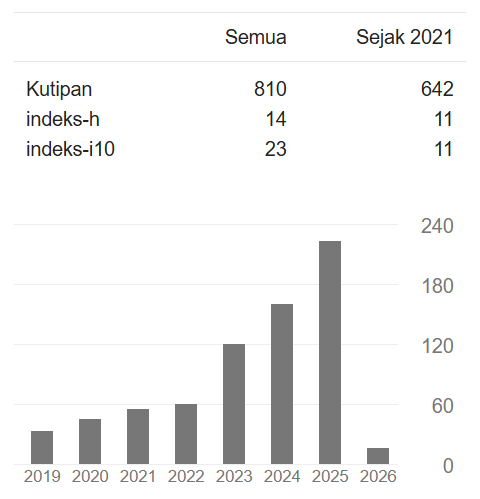DISCOURSE ON MOVEMENT AND THE THEORY OF TRANSUBSTANTIAL MOVEMENT OF MULLĀ ṢADRĀ IN THE PROCESS OF PERFECTION OF THE SOUL
DOI:
https://doi.org/10.20871/kpjipm.v10i2.380Keywords:
Accident, Existence, Motion, Soul, Trans-Substantial MotionAbstract
Motion is a natural law that both physicists and philosopher’s study. Physicists persistently pursued the concept of motion, but motion in modern science is only elaborated as a material natural phenomenon so do the Greek and peripatetic philosophers in the Islamic philosophy tradition. The fundamental question this article wants to answer is whether motion is only limited to material and accidental as believed by Physicists and Greek and peripatetic philosophers in the Islamic philosophy tradition. Mullā Ṣadrā, the philosopher of muta‘āliyah wisdom, shows evidence that motion is not limited to these two things but also occurs at the substance level (al-ḥarakah al-jawhariyyah). The problem in this case, which is also related to the Soul as the Substance of the human self is whether the soul experiences motion and if the soul experiences motion, what kind of motion happens to it. To answer this, a literature study was conducted using an analytical argumentative approach commonly used in philosophical research. Based on the evidence used by Mullā Ṣadrā, it can be proven that the movement is not only limited to the accidental level but also the substance level besides the soul experiences movement, which is the movement of perfection in the physical and spiritual as well as in the world and afterlife.
Downloads
References
Bahrami, Mohammadmahdi, and Mohammad Raayat Jahromi. 2024. “The Effect of Catharsis on the Audience of Tragedy, in R Elation to Mulla Sandra’s Theory of Substantial Motion.” Sadra’i Wisdom 12 (1): 107–22. https://doi.org/10.30473/pms.2023.68316.2029.
Bilad, Cecep Zakarias El. 2018. “The Concept of Motion in Mullâ Ṣadrâ’s Philosophy: An Ontological Understanding of the Human Soul’s Development.” Jurnal Ushuluddin 26 (1): 82–94. https://doi.org/10.24014/jush.v26i1.4224.
Corbin, Henry. 1984. “Introduction I Esquisse Biographique.” In Le Livre Des Pénétrations Métaphysiques (Kitâb al-Mashâ’ir), by Shadr al-Din Muhammad Shirazi, translated by Badi‘ al-Mulk Mīrzā ‘Imād al-Dawlah. Tehrān: Kitābkhāneh-ye Ṭahūr.
Daftari, Abdulaziz. 2010. “Mulla Sadra and the Mind-Body Problem: Critical Assessment of Sadra’s Approach to the Dichotomy of Soul and Spirit.” Durham University.
Damad, Mir. 1967. Al-Qabasat. Tehran: McGill University Institute of Islamic Studies & Tehran University Press.
Darrehbaghi, Fateme Soleimani. 2021. “The Position of Character and Emotions in a Human Being’s Existence According to Mulla Sadra.” Journal of Philosophical Theological Research 23 (2): 129–53. https://doi.org/10.22091/JPTR.2021.6386.2454.
Fakhry, Majid. 2004. A History of Islamic Philosophy. New York: Columbia University Press.
Fārābī, Abū Naṣr al-. 1985. Arā’a Ahl al-Madīnah al-Fādilah. Edited by Albert Nader. Dār al-Mashriq.
Furley, David. 1999. Routledge History of Philosophy. From Aristotle to Augustine. Routledge.
Gohari, Hadi Rastgar Moghadam. 1378. “Ma‘ād az Dīdgāh-e Ḥukamā wa Ṣadr al-Muta’allihīn.” Khodr-nāmah-ye Ṣadrā 15:68–73.
Gribbin, John, and Michael White. 1992. Stephen Hawking: A Life in Science. New York: Viking Press.
Harris, HS. 1983. Hegel’s Development: Night Thoughts. Oxford: Clarendon Press.
Heilbron, John L. 2003. The Oxford Companion to the History of Modern Science. Oxford: Oxford University Press.
Huff, Toby E. 2003. The Rise of Early Modern Science. New York: Cambridge University Press.
Ibnumalik, Imam, Ali Bowo Tjahjono, Toha Makhsun, and Pendidikan Agama Islam. 2022. “Konsep Teosofi Transendental Mulla Sadra dan Implikasinya dalam Praktik Pendidikan Tauhid.” In Konstelasi Ilmiah Mahasiswa Unissula (KIMU) 7, 389–421. Semarang: Universitas Islam Sultan Agung.
Jamebozorgi, Mohamad Jafar. 2024. “The Existence of Motion and Its Realization According to Allameh Tabataba’i.” Shinakht (A Persian Word Means Knowledge) 17 (1): 11–29. https://doi.org/10.48308/kj.2024.230770.1156.
Jun, Ni. 2014. Principles of Physics: From Quantum Field Theory to Classical Mechanics. London: World Scientific Publishing.
Kalin, Ibrahim. 2010. Knowledge in Later Islamic Philosophy: Mulla Sadra on Existence, Intellect, and Intuition. Oxford: Oxford University Press.
Kamal, Muhammad. 2006. Mulla Sadra’s Transcendent Philosophy. USA: Ashgate.
Kamankesh, Pegah, and Zahra Ghayedi. 2023. “The Application of Innate Knowledge in Proving the Existence of God from the Perspectives of Descartes and Mulla Sadra.” Journal of Science and Engineering Elites 12 (47): 84–92. https://doi.org/10.22059/jpht.2022.331831.1005859.
Lee, Newton. 2019. The Transhumanism Handbook. Edited by Lee Newton. California: Springer.
Lohse, Simon. 2017. “Pragmatism, Ontology, and Philosophy of the Social Sciences in Practice.” Philosophy of the Social Sciences 47 (1): 3–27. https://doi.org/10.1177/0048393116654869.
Mostafavi, Nafise, and Zahra Arefinia. 2021. “International Journal of Multicultural and Multireligious Understanding Substantial Motion: From Mulla Sadra’s Philosophy to Physics.” International Journal of Multicultural and Multireligious Understanding 8 (10): 86–94.
Nasr. 2001. Science and Civilization in Islam. Chicago: ABC International Group.
———. 2006. Islamic Philosophy from Its Origin to The Presents: Philosophy in The Land of Prophecy. New York: State University of New York Press.
Nasr, and Leaman. 1996. History of Islamic Philosophy. New York: Routledge.
Nejati, Mohammad, Farid Moeinpour, Feme Sadat, and Mohseni Shahri. 2020. “A Comparative Study of the Intrinsic Motion of Elementary Particles and the Substantial Motion of Mulla Sadra.” Biannual Journal 11 (1): 267–90. https://doi.org/10.30465/srs.2020.5522.
Newton, Isaac. 1846. The Mathematical Principles of Natural Philosophy. Translated by Andrew Motte. New York: Daniel Adee.
Nurdin, Fauziah Nurdin, Hasyimsyah Nasution, and Hasan Bakti Nasution. 2019. “Transcendental Epistemology Study of Philosophy of Wisdom Muta’aliyah Mulla Sadra.” Budapest International Research and Critics Institute-Journal (BIRCI-Journal) 2 (4): 528–536.
Papakonstantinou, Margarita, and Michael Skoumios. 2021. “Science and Engineering Practices in the Content of Greek Middle School Physics Textbooks about Forces and Motion.” Journal of Technology and Science Education 11 (2): 457–73. https://doi.org/10.3926/jotse.1286.
Rahman, Fazlur. 1975. The Philosophy of Mullā Sadrā. Albany: SUNNY Press.
Rahmat, Jalaluddin. 2004. “Hikmah Muta’aliyah: Filsafat Islam Pasca Ibn. Rusyd.” In Kearifan Puncak (Hikmah al-Arsyiah), by Mulla Shadra, translated by D. Mahayana and D Djunardi. Yogyakarta: Pustaka Pelajar.
Ramin, Farah. 2020. “Mullā Sadrā’s Doctrine of the Trans–Substantial Motion.” International Journal of Arts, Humanities & Social Science 1 (2): 27–36.
Rushd, Ibn. 1995. Talkhīṣ al-Kawn wa al-Fasad. Beirūt: Dār al-Gharb al-Islāmī.
Shanazari, Jafar, and Marziyah Hadi. 2020. “The Necessity, Impossibility or Possibility of Substantial Motion from the Viewpoint of Ibn Sina and Mulla Sadra.” Journal of Ontological Researches 9 (17): 77–97.
Sharif, MM. 1963. History of Islamic Philosophy. Lahore: Pakistan Philosophical Congress.
Shīrāzī, Ṣadr al-Dīn Muḥammad al-. 1981. Al-Ḥikmah al-Muta‘āliyah fī al-Asfār al-‘Aqliyyah al-Arba‘ah. Beirūt: Dār Iḥyā’ al-Turāth al-‘Arabī.
———. 1987. Al-Qur’ān al-Karīm. Qūm: Bīdār Publisher.
———. 1999. Risālah fī al-Ḥudūth (Ḥudūth al-‘Ālam). Edited by Muḥammad Khāmeneh’ī and Ḥusayn Mūsavīyān. Tehrān: Bonyād-ī Ḥikmat-e Islāmi-ye Ṣadrā.
———. n.d. Al-Shawāhid al-Rubūbiyyah. Beirūt: Markaz-e Nashr-e Daneshgahi (Academic Publishing Center).
Sholeh, Muh Ibnu, M. Munif, Sokip, and Asrop Syafi’i. 2024. “Philosophical Insights on Al-Wujud by Mulla Sadra in the Context of Islamic Philosophy.” Tamadduna: Jurnal Peradaban 1 (2): 54–66. https://doi.org/10.29313/tamadduna.v1i2.4870.
Sīnā. 1984. Al-Shifā’. Qom: Ayatollah Mar‘ashi Najafi Library.
———. 1996. Al-Ishārāt wa al-Tanbīhāt. Qūm: Nashr al-Balāghah.
Strauss, Leo. 1963. A Seminar on Aristotle’s Ethics: A Course Given in The Spring Quarter, 1963. Chicago: The University of Chicago.
Ṭabāṭabā’ī, Muḥammad Ḥusayn. 1387. Bidāyah al-Ḥikmah. Qūm: Dār al-Fikr.
Ucar, Taner, and Onur Merter. 2022. “Predictive Model for Constant-Ductility Energy Factor Spectra of Near- and Far-Fault Ground Motions Based on Gauss-Newton Algorithm.” Journal of Earthquake Engineering 26 (15): 7689–7714. https://doi.org/10.1080/13632469.2021.1964653.
Verawati, Ni Nyoman Sri Putu, Lia Saptini Handriani, and Binar Kurnia Prahani. 2022. “The Experimental Experience of Motion Kinematics in Biology Class Using PhET Virtual Simulation and Its Impact on Learning Outcomes.” International Journal of Essential Competencies in Education 1 (1): 11–17. https://doi.org/10.36312/ijece.v1i1.729.
Walid, Kholid Al. 2023. “Mulla Sadra’s Realism on The Principle of Ittihad al-’Aqil Wa al-Ma’qul: A Response to Modern Realism” 11:177–202. https://doi.org/10.21043/fikrah.v8i1.
Whitehouse, David. 2009. Renaissance Genius: Galileo Galilei & His Legacy to Modern Science. New York: Sterling Publishing.
Yazdi, Muḥammad Taqi Miṣbāḥ. 2000. Sharh Asfār Arba‘ah. Qom: Intishārat Omuzishi wa Pezuheshi Imām Khumaynī.
Downloads
Published
How to Cite
Issue
Section
License
Copyright (c) 2024 Kholid Al Walid

This work is licensed under a Creative Commons Attribution 4.0 International License.
Most read articles by the same author(s)
- Kholid Al Walid, MULLĀ ṢADRĀ'S CRITICISM OF REINCARNATION , Kanz Philosophia: A Journal for Islamic Philosophy and Mysticism: Vol. 9 No. 1 (2023): June





























